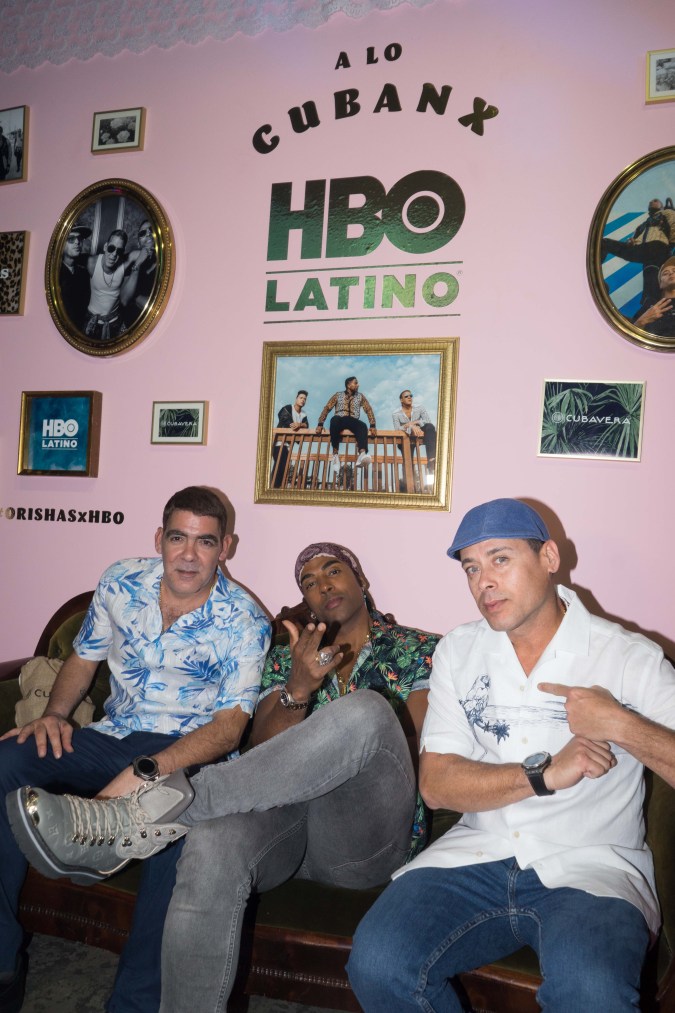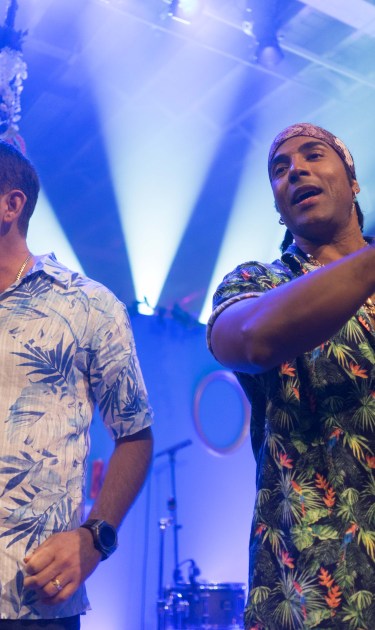It’s been nearly 20 years since Orishas arrived on the world stage with their debut album A lo Cubano, an innovative fusion of hip-hop and traditional Afro-Cuban genres and rhythms, like bolero, rumba and bembé. Their music took a creative risk, unapologetically embracing Cuba’s Yoruba roots and daring to collide them with US-influenced hip-hop, even as Cuba was heavily censoring US culture on the island. The result was a groundbreaking sound that catapulted the group to global fame, earning the group a Latin Grammy and creating a conversation about contemporary black Cuban identity.
In 2009, after a decade of recording and touring, Orishas took a 7 year hiatus, during which members Yotuel Romero, Roldán González and Ruzzo Medina had no contact. Then, in 2016, the group was inspired to reunite, in part motivated by the renewed global interest in urbano sounds.
With a concert special debuting on HBO Latino this week, a tour underway, and a newly announced partnership with Cubaveras under their belt, we caught up with Yotuel to hear about Orishas’ history and the legacy they have created for the next generation of urbano artists.
Havana Street Party Presents Orishas premieres on Friday, March 15th at 8pm EST on HBO Latino. The concert is available on all HBO digital platforms (HBO GO, HBO Now, and HBO on Demand).

This interview has been lightly edited for clarity.
When did you first discover hip hop culture?
My father traveled to Miami on the Mariel [boatlift]. I said ‘Send me music, I want to hear about what’s happening.’ In 1995, he sent me Q-Tip’s album, and I fell in love with it. And then he sent me Wu-Tang Clan. I said ‘Wow.’ I was surprised to hear lyrics talking about history and social issues. I said, ‘I want to do the same.’ I didn’t study music, but I had a lot of things to say in my heart. And I used hip-hop music to be free. We started with Amenaza, the first rap group I was part of in Cuba.
Orishas made songs about working-class Havana neighborhoods, about cutting sugar cane, about sexual tourism. What were you trying to express about the Cuban experience?
The vision was to show people the reality of young people in Cuba. On A lo Cubano, for example, we had a song called “Atrevido” which talks about the jineteras [a Cuban slang term for female sex workers]. It talks about the yumas [Americans], who would come to Cuba and think that we were indios who could be sexually exploited.
In “Atrevido” we flipped the script, telling a story about a couple who makes a plan to [resist] and rob a yuma instead.
The stories we told were so real, that people connected directly and immediately with Orishas in Cuba. When I was in Amenaza, we had a problem with the government, they said we couldn’t make our music because [hip-hop] was from the enemy [United States]. They didn’t understand why we’d want to talk about hip-hop within a communist system. And I thought “I have a lot of things to say, and I [should be] free to say what I want.

What was the impact of talking about these realities in your music?
I think the revolution that Orishas started pushed young people in Cuba to [imagine something different.] Before, all the young people in Cuba wanted to be traditional musicians, and when Orishas came out, we changed the possibilities young Cubans were able to envision for their music careers. We went in a different direction, and a lot of people followed us. And right now, urban music is dominating in Cuba – it’s everywhere. You don’t just hear traditional music anymore, you hear urbano.
Did you experience or were you conscious of racism growing up in Cuba?
Amenaza had a couple of songs that spoke strongly against racism in Cuba, because we experienced a lot of racism. Sometimes that reality was so [hard] that I didn’t want to show it to the world. But our music had a message: “I’m black, so what?” We have a song called that talks about not being black enough or white enough, because I’m mixed race. Many Cubans are also [mixed race], and I talked about what it’s like to be in that position. I felt free [talking about it].
Can you talk about the decision to name the group Orishas? It seemed like a deliberate way of creating a direct link between the group and the African diaspora.
We decided on that name because for us Orishas means Cuba. It’s not only the name of all the gods from the Yoruba religion, from Santería. Orishas also means colors, means foods, means tradition, means blackness, means roots. So, using that name was a way to show the world “this is who we are.” But at the same time, it was a big responsibility – Orishas is a powerful name [associated with spirituality], so the music needed to be the same: powerful and great.
You guys were pioneers of fusing traditional Cuban sounds with hip-hop, and today there are more artists who are incorporating Yoruba influences in new ways, like Ibeyi.
It’s funny you mention Ibeyi, because their father, Miguel “Angá” Diaz, worked with Orishas. He was the first guy who got Orishas together. He recorded all percussion on our first album, and Angá Diaz was a pioneer of mixing sounds. When he discovered Amenaza, because he found us, he told me “You need to go to Paris, I want to introduce you to somebody who makes hip-hop and can help you guys to make music.” And when we went to Paris, Angá told me to come to the studio, and he introduced me to [collaborators] Niko Nocchi, and Liván [Nuñez], and then we made Orishas. So I’ve known Ibeyi since they were little.
How does it make you feel to see the next generation incorporating Yoruba culture, fusing it with other music?
Amazing. This was the mission, to show to the world how important Africa is in Cuba. And I see it right now not only in Ibeyi, but in Camila Cabello, and in Cardi B with Bad Bunny & J Balvin – the way they mixed boogaloo with hip-hop on “I Like it.” I recently spoke with the producer Tainy and he told me “I grew up listening to Orishas and your sound inspires my music.” That’s amazing to me.




